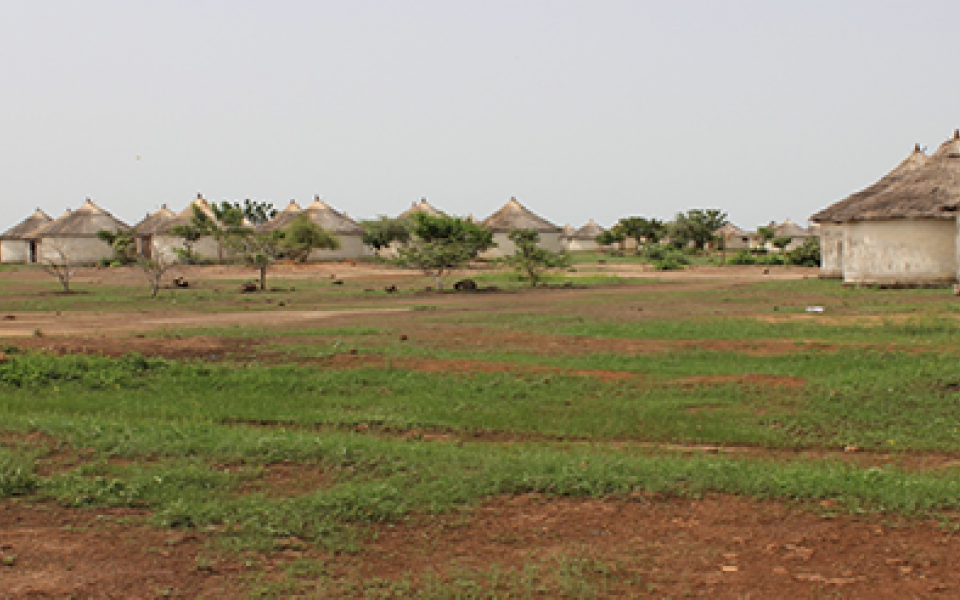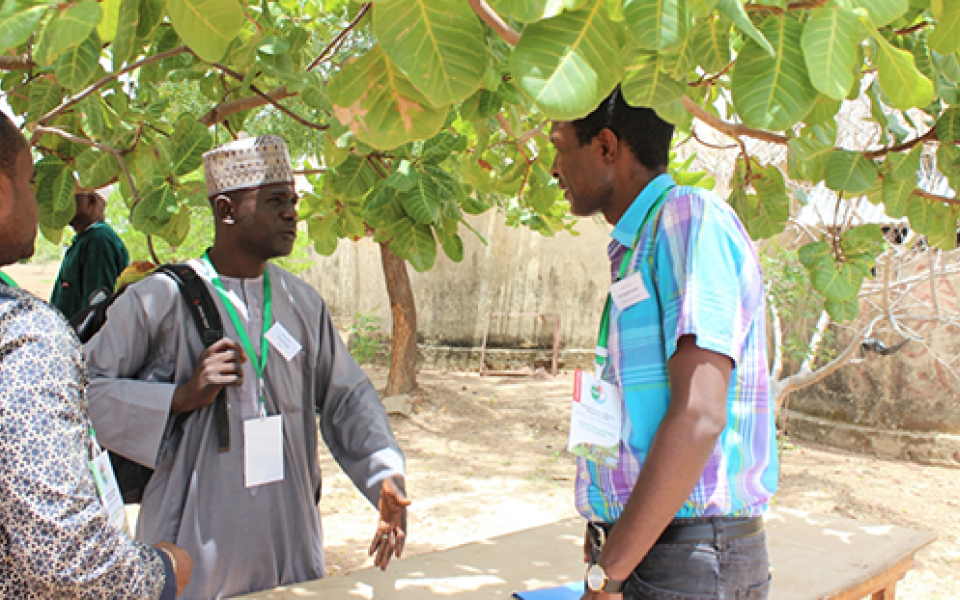Global Dialogue on the Right to Adequate Food and Nutrition and the Sub-Regional Conference of the Convergence of Land and Water Struggles
Held on the 25th - 27th of June, 2015 at Selinge and Bamako, Mali

Venue: Nyeline Center, Selinge, Mali
Description of the Venue
The Nyéléni Training Center, Sélingué, is situated about two to three hours drive from Bamako. The center is built on 5 hectares of land at the edge of the lake and the Sélingué Dam on the Sankarani River. The Forum for Food Sovereignty was held here in 2007. The infrastructure is designed to provide good working conditions for international meetings and tourists.
Introduction
Following the recommendations by GRAIN in Montreal, Canada and its West African Regional Office to FIAN, Germany, the Center for Environmental Education and Development (CEED) Taraba State, Nigeria was invited to take part at the "Sub-Regional Conference – West Africa – of the Convergence of Land and Water Struggles" as well as the "Global Dialogue on the Right to Adequate Food and Nutrition: Building on the Experiences of Brazil and India" on the 28 and 29 June 2015. While the “Sub-Regional Conference – West Africa – of the Convergence of Land and Water Struggles” was organized in order to initiate a process of building a convergence in the sub-region, the “Global Dialogue on the Right to Adequate Food and Nutrition” brings together members of civil society organizations and representatives of the West African governments to discuss – drawing on the experiences of two countries in different regions of the world – issues concerning food security and role of the State to guarantee the right to adequate food.
Arrival
24th of June, 2015: Arrived Bamako, Mali, on the 23rd of June, 2015 and was accommodated at Priere Retourner SVP aur: CRES Bamako. All participants stayed at CRES until 24th June, 2015 before moving to Nyéléni Center in Sélingué.
Objectives of the Sub-Regional Conference – West Africa – of the Convergence of Land and Water Struggles
The sub-regional conference aims at achieving four objectives:
- Share experiences of struggles for land and water in several West-African countries, in order to identify and analyze main dynamics, problems and threats;
- Share knowledge about relevant processes and instruments (international and regional) for the sub-regional convergence on land and water struggles;
- Reflect on the strategy on how to deal with and engage in these processes in a coordinated way at a sub-regional level, in line with the Dakar to Tunis Declaration and the Global Convergence;
- Establish a sub-regional platform of the Global Convergence, including a work plan on how to root and broaden it at national level.
Day One: Thursday, 25th June, 2015
The activities marking the commencement of the conference started with opening ceremonies at about 9:00am. CNOP and CMAT Mali brought opening greetings. The session was chaired by Ms. Claire Quennum from Togo. The participants read the Dakar Declarations 2015, led by Mr. Massa Kone and Ms. Ndri Yale.
Presentations
The first presentations on the “Guidelines on Responsible Governance of Land, Fisheries and Forest and the application of the Guidelines to Fight Against Land Grabbing in Mali (West Africa) were done by Ms. Chantal Jacovetti (CMAT/CNOP) Mali. This was followed by “Action Plan of the African Union’s Land Policy Initiative (LPI) by Mr. Ange David. Plenary discussions were taken focusing on key questions coming from participants.
Lunch Break 1300-1400
Presentations continued after Lunch with “Human Rights, and International and African Institutions: Supporting the Land and Water Struggles through protection of Human Rights Systems at the UN Levels and in Africa” by Mr. Valentine Hategekimana (FIAN). This was followed by “Declaration on the Rights of Peasants and Other People Working in Rural Areas” by Mr. Ndiakhate Fall (CNCR/Via Campesina). Discussions continued at the plenary with questions and answers until 17h30-17h40 when the day one session came to a close.
Day Two: Friday, 26th June, 2015
The events of the 2nd day were framed by “Sharing Experiences: Problems, Threats and Advances in Land and Water Struggles”. The session was chaired by Mr. Simon Bodea (SYNPA-Benin). By 9h40-11h00, plenary sessions began with presentations of the situations on the problems, threats and advanced struggles over land and water in different West African Countries. Organizations were given five minutes to make short presentations on the prevailing circumstances in his/her country. The presentations continued until 14h00, when participants proceeded to lunch. Before proceeding to lunch, an interesting discussion was taken on “Women and Land Rights in Africa”. It took a good deal of time for participants to share experiences on the applicability of the issues at country levels. In the end, it was agreed that more space be created for women participation in policy and decision making processes.
Afternoon Session
Lunch Break at 15h00. Presentations and discussions continued on the understanding of the G8’s New Alliance for Food Security and Nutrition in Africa, looking critically into the work of the actors in Senegal (by Mr. Siddy Ba), Burkina Faso (by Dr. Aimee Nikiema) and Nigeria (by Enoch, Nyayiti Raymond). The discussion at the plenary continued after presentation by the three (3) speakers while looking into the strategies of approaching G8’s New Alliance for Food Security and Nutrition in Africa by the civil society organizations in West Africa.
- Organization of country level actions on G8’s New Alliance concepts, of which, according to participants, there is nothing concrete.
- Where is the position of the African leaders on the Maputo Declaration in relation to small holder farmers, family farming, etc.?
Day Three: Saturday 27th June, 2015
9h00-11h00: Strategies and Actions to Strengthen the Land and Water Struggles in West Africa. The session was chaired by Mr. Inusa Kamara (Sierra-Leone). After taking a look or review of the previous day’s proceedings presented by Maryline Bisilliat (PPP) and Mr. Valentine Kategekimana (FIAN), the meeting continued with a presentation of the Global Convergence of Land and Water Struggles. Proposals for the establishment of the Convergence in the Sub-Region of West Africa were put forward by Mr. Massa Kone (CMAT/UACDDDD Mali).
The presentation and proposal put forward elicited discussions and comments as the Sub-Regional Convergence in West Africa on Land and Water. Why do we create a convergence?
Proposals
The syndicates and working groups were formed on the following proposals to discuss and put forward concrete actions for the West African Sub-Region.
- How to build the convergence at the national levels
- How to build the West African Convergence levels (short and long terms actions)
- Advocacy on the use of the tools and instruments to push the agenda of the convergence at the national levels
- Partnership in the Sub-Regional levels
- Social mobilization
Presentation of the Syndicate Group Work
Each group took time, one after another, to make presentations at the plenary for a debate of each points considered at each group.
Closing
The three day meeting came to an end at about 6pm with a review of the discussions had so far.
This report was put together by Enoch, Nyayiti Raymond this 27th Day of June, 2015 at Nyeleni Center, Selinge Mali.
Trip to Bamako: Sunday, 28th June, 2015
Global Dialogue Workshop on Right to Food and Nutrition: Experiences of State Actions to Battle Hunger.
Commencement/Opening Ceremonies
The travel from Nyelin Center in Selinge, to the capital city of Mali, climaxed the beginning of the Global Dialogue at Hotel Mande, Bamako. The meeting began by 2:30pm with speeches from government representatives of Ministry of Agriculture and Rural Development, CNOP Mali and the conveners: Mr. Harsh Mander from Center for Equity India and FIAN Representatives, made speeches. The speeches reinforced the objectives of the Global Dialogue, which is to share lessons and develop partnerships with developing countries that are facing similar challenges of addressing rights to food and nutrition. In particular, the meeting will involve:
- Sharing experience and debates associated with two cases (Brazil and India)
- Better understand issues, lessons and challenges in other countries and why?
- Invite an on-going engagement between countries via Knowledge Sharing Partnerships.
- Should they state take a responsibility to provide food to its population?
- Is it a solution to hunger that government should provide food for its citizens?
- Does the government have the capacity to do so if it is to provide food for its citizens?
Mr. Harsh Mander, CES India, facilitated the day one session and it was interactive.
Day Two: 29th June, 2015
The deliberations on the 2nd day began at 8:45am with a recap of the previous day’s accomplished deliberations. Working groups were established to look into the flowing issues in their countries and report back a plenary session.
- What is desirable/needed?
- What is feasible?
- Support needed?
The Nigerian country team at the meeting was CEED Nigeria and Federal Ministry of Justice. A report of the working groups was taken and recommendations towards of the meeting followed. After this, The West African Convergence for Land, Water and Seed was invited to present its declarations taken at the Nyeline conference. Mr. Kone Massa (CMAT –Mali) Ms. Quenum Claire (Togo), and Mr. Nyayiti Raymond Enoch (Nigeria) were invited to perform that task (see the Declarations).
Feedback
Participants were asked to give their feedback on the Global Dialogue and the way forward.

Mr. Enoch, Nyayiti Raymond (from CEED Nigeria) discussing with Mr. Valentine Hategekimana (a staff of FIAN Germany) while Mr. Raymond Tettes Commey (from ECASARD Ghana) listens with keen interest to issues at the conference.
